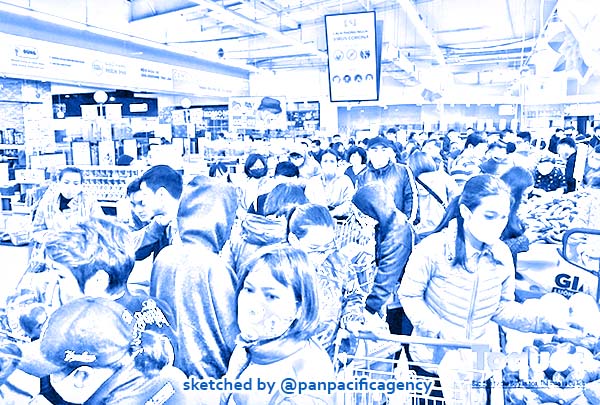Stay home ‘or share Italy’s Covid experience’: Thai scientist

People are shopping at a supermarket to reserve foodstuffs due to Covid-19. Photo: The Hanoi Times. Sketched by the Pan Pacific Agency.
BANGKOK, Mar 23, 2020, Bangkok Post. People must stay home and not socialise, or Thailand will become like Italy with coronavirus patients overwhelming health resources and medical personnel having to decide which patients to treat, or not, the dean of the faculty of medicine Siriraj Hospital, Mahidol University, warned on Monday, Bangkok Post reported.
Prof Dr Prasit Watanapa issued his caution via the university’s online television channel.
He said the number of people with novel coronavirus disease (Covid-19) in Thailand was soaring, like those of the European countries that were unable to control the disease.
He blamed the situation on people who visited virus-spreading venues like boxing stadiums and pubs, and refused to self-isolate.
Countries that failed to control the disease saw Covid-19 cases rise from 100 to 200 in three days. The increase in Thailand took 3.5 days, Dr Prasit said.
“If we do nothing, we will become a country that is unable to control the disease,” he said.
The number of Covid-19 cases in Thailand was rising by 33% daily. At this rate, the number of infections would reach about 350,000 and deaths total about 7,000 by April 15, Dr Prasit said.
The number of critically ill people would by then be about 17,000 – and that would exceed the country’s medical resources.
“That would be like the situation in Italy. Decisions would then have to be made whether to treat someone, or not. I do not want that to happen,” Dr Prasit said.
To keep the number of Covid-19 patients within the country’s capacity to treat them, the increase in local cases must be limited at 20% daily.
“To achieve this, people must stay at home, do not socialise… If you must go out to buy food, you must wear a mask, go the shortest distance and return home as fast as possible,” Dr Prasit said.
“Talking normally to another person produces droplets that travel about one metre. So people must stay at least two metres apart. When you are talking to people, you must wear a mask. Wash your masks daily,” he said.
“A communicable disease cannot be transmitted if people do not make contact. Home is the safest place, unless there is an infected person.”
Following this practice would limit the case increase rate to within 20% a day, or at 32.7 new cases a day. “It is difficult, but still possible. It must start today, or it would be too late,” Dr Prasit said.
With social distancing, the number of new cases would start to fall in four weeks, he said.
He also called for a complete ban on visitors, saying thermal scans did not work because many infected people did not have a fever during their initial period of infection.
“When they have a fever, the disease has already damaged their lungs and they will need lung support devices,” Dr Prasit said.
The countries that were able to control Covid-19 were Hong Kong, Japan and Singapore, he said.
Dr Prasit estimated the Covid-19 outbreak would continue in Thailand for about nine months.